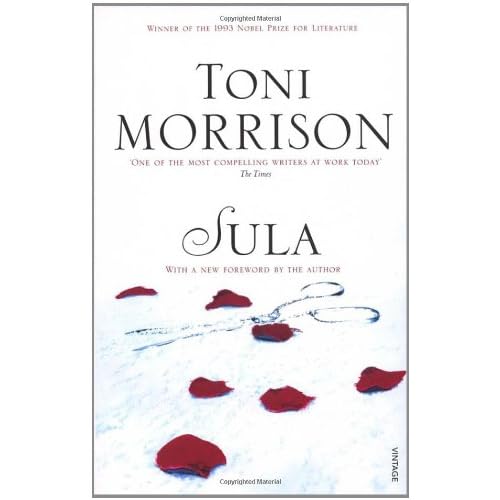 Spanning almost forty-five years (1921-1965), Sula revolves around two best friends: Sula and Nel, and how their friendship evolves and implodes over the years.
Growing up in a poverty-stricken black town in Ohio called Bottom, Sula is accustomed to men coming and going, as they please. Her mother and grandmother are fiercely independent women, and after her father died, her mother (Hannah) is keen for companionship, and doesn't really care if the man is married or not. Still, Hannah is well-liked, despite sleeping with half the married men in the town... That stands testimony to the richness of the characters - that Morrison can make someone quite despicable come across as a lovely person.
Spanning almost forty-five years (1921-1965), Sula revolves around two best friends: Sula and Nel, and how their friendship evolves and implodes over the years.
Growing up in a poverty-stricken black town in Ohio called Bottom, Sula is accustomed to men coming and going, as they please. Her mother and grandmother are fiercely independent women, and after her father died, her mother (Hannah) is keen for companionship, and doesn't really care if the man is married or not. Still, Hannah is well-liked, despite sleeping with half the married men in the town... That stands testimony to the richness of the characters - that Morrison can make someone quite despicable come across as a lovely person.
Sula is a complex character though. Straight after Nel's wedding, she leaves Bottom, and goes off to college and to enjoy the city life. She returns some ten years later, and carries on where her mother left off - sleeping with the men in the village and living a purely hedonist life.
The town-folk treat her as a pariah - the yardstick against which they measure good and evil. The truly godawful people in the town turn over a new leaf, and Sula continues to do as she pleases.
"When you gone to get married? You need to have some babies. It’ll settle you.'
'I don’t want to make somebody else. I want to make myself."
The glimpses into the lives of the villagers, through the years is not pleasant. Accidentally killing people, murders, a mother setting her own son on fire, and a daughter watching her mother burn with indifference, infidelity, broken promises and Suicide Day - this book really doesn't make for comfortable reading, but then again, that's not what Morrison's aim was, with this book.
Instead, it's a glimpse into the trials and tribulations of the African-American society in America in the early 1900s, where they are left to themselves and their own superstitions, trying to figure out where they belong. It's a world where racism is rampant, and even the proudest African-American is subservient to the white people, when they are forced to interact.
The richness of the characters, and the depth of the story, despite it being a short book (174 pages) is incredible and it does show why Morrison is considered to be one of the most talented authors out there. While my first experience with Morrison wasn't exactly amazing (I hated it), with time, I am slowly beginning to love her writing as much as some of the other bloggers out there, and I reckon with time, I will read her entire backlist. Love is next for me. And for you? Which is your favourite book by the Nobel Laureate?
 I finished this book over two weeks ago, and have been struggling to write the review ever since. I honestly hoped I wouldn't have to drag it into the new year, but there you have it...
This is the first Toni Morrison I've read, and I started the book with great trepidation. I've heard phenomenal things about Toni Morrison, and I was intimidated... unsure of what to expect. I really hoped I'd enjoy the book, and it would make me go out and buy more books by Morrison instantaneously, but unfortunately, I was left feeling fairly indifferent. I didn't like the book. I didn't dislike the book... and I'm not accustomed to having that kind of a reaction to a book - especially as I've mulled over it for about two weeks!
I finished this book over two weeks ago, and have been struggling to write the review ever since. I honestly hoped I wouldn't have to drag it into the new year, but there you have it...
This is the first Toni Morrison I've read, and I started the book with great trepidation. I've heard phenomenal things about Toni Morrison, and I was intimidated... unsure of what to expect. I really hoped I'd enjoy the book, and it would make me go out and buy more books by Morrison instantaneously, but unfortunately, I was left feeling fairly indifferent. I didn't like the book. I didn't dislike the book... and I'm not accustomed to having that kind of a reaction to a book - especially as I've mulled over it for about two weeks!